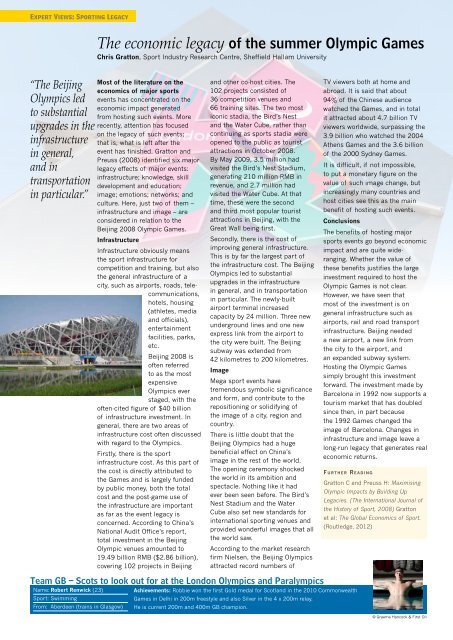Summer - Royal Scottish Geographical Society
Summer - Royal Scottish Geographical Society
Summer - Royal Scottish Geographical Society
Create successful ePaper yourself
Turn your PDF publications into a flip-book with our unique Google optimized e-Paper software.
Expert Views: Sporting Legacy<br />
The economic legacy of the summer Olympic Games<br />
Chris Gratton, Sport Industry Research Centre, Sheffield Hallam University<br />
“The Beijing<br />
Olympics led<br />
to substantial<br />
upgrades in the<br />
infrastructure<br />
in general,<br />
and in<br />
transportation<br />
in particular.”<br />
Most of the literature on the<br />
economics of major sports<br />
events has concentrated on the<br />
economic impact generated<br />
from hosting such events. More<br />
recently, attention has focused<br />
on the legacy of such events;<br />
that is, what is left after the<br />
event has finished. Gratton and<br />
Preuss (2008) identified six major<br />
legacy effects of major events:<br />
infrastructure; knowledge, skill<br />
development and education;<br />
image; emotions; networks; and<br />
culture. Here, just two of them –<br />
infrastructure and image – are<br />
considered in relation to the<br />
Beijing 2008 Olympic Games.<br />
Infrastructure<br />
Infrastructure obviously means<br />
the sport infrastructure for<br />
competition and training, but also<br />
the general infrastructure of a<br />
city, such as airports, roads, telecommunications,<br />
hotels, housing<br />
(athletes, media<br />
and officials),<br />
entertainment<br />
facilities, parks,<br />
etc.<br />
Beijing 2008 is<br />
often referred<br />
to as the most<br />
expensive<br />
Olympics ever<br />
staged, with the<br />
often-cited figure of $40 billion<br />
of infrastructure investment. In<br />
general, there are two areas of<br />
infrastructure cost often discussed<br />
with regard to the Olympics.<br />
Firstly, there is the sport<br />
infrastructure cost. As this part of<br />
the cost is directly attributed to<br />
the Games and is largely funded<br />
by public money, both the total<br />
cost and the post-game use of<br />
the infrastructure are important<br />
as far as the event legacy is<br />
concerned. According to China’s<br />
National Audit Office’s report,<br />
total investment in the Beijing<br />
Olympic venues amounted to<br />
19.49 billion RMB ($2.86 billion),<br />
covering 102 projects in Beijing<br />
and other co-host cities. The<br />
102 projects consisted of<br />
36 competition venues and<br />
66 training sites. The two most<br />
iconic stadia, the Bird’s Nest<br />
and the Water Cube, rather than<br />
continuing as sports stadia were<br />
opened to the public as tourist<br />
attractions in October 2008.<br />
By May 2009, 3.5 million had<br />
visited the Bird’s Nest Stadium,<br />
generating 210 million RMB in<br />
revenue, and 2.7 million had<br />
visited the Water Cube. At that<br />
time, these were the second<br />
and third most popular tourist<br />
attractions in Beijing, with the<br />
Great Wall being first.<br />
Secondly, there is the cost of<br />
improving general infrastructure.<br />
This is by far the largest part of<br />
the infrastructure cost. The Beijing<br />
Olympics led to substantial<br />
upgrades in the infrastructure<br />
in general, and in transportation<br />
in particular. The newly-built<br />
airport terminal increased<br />
capacity by 24 million. Three new<br />
underground lines and one new<br />
express link from the airport to<br />
the city were built. The Beijing<br />
subway was extended from<br />
42 kilometres to 200 kilometres.<br />
Image<br />
Mega sport events have<br />
tremendous symbolic significance<br />
and form, and contribute to the<br />
repositioning or solidifying of<br />
the image of a city, region and<br />
country.<br />
There is little doubt that the<br />
Beijing Olympics had a huge<br />
beneficial effect on China’s<br />
image in the rest of the world.<br />
The opening ceremony shocked<br />
the world in its ambition and<br />
spectacle. Nothing like it had<br />
ever been seen before. The Bird’s<br />
Nest Stadium and the Water<br />
Cube also set new standards for<br />
international sporting venues and<br />
provided wonderful images that all<br />
the world saw.<br />
According to the market research<br />
firm Nielsen, the Beijing Olympics<br />
attracted record numbers of<br />
Team GB – Scots to look out for at the London Olympics and Paralympics<br />
Name: Robert Renwick (23)<br />
Sport: Swimming<br />
From: Aberdeen (trains in Glasgow)<br />
TV viewers both at home and<br />
abroad. It is said that about<br />
94% of the Chinese audience<br />
watched the Games, and in total<br />
it attracted about 4.7 billion TV<br />
viewers worldwide, surpassing the<br />
3.9 billion who watched the 2004<br />
Athens Games and the 3.6 billion<br />
of the 2000 Sydney Games.<br />
It is difficult, if not impossible,<br />
to put a monetary figure on the<br />
value of such image change, but<br />
increasingly many countries and<br />
host cities see this as the main<br />
benefit of hosting such events.<br />
Conclusions<br />
The benefits of hosting major<br />
sports events go beyond economic<br />
impact and are quite wideranging.<br />
Whether the value of<br />
these benefits justifies the large<br />
investment required to host the<br />
Olympic Games is not clear.<br />
However, we have seen that<br />
most of the investment is on<br />
general infrastructure such as<br />
airports, rail and road transport<br />
infrastructure. Beijing needed<br />
a new airport, a new link from<br />
the city to the airport, and<br />
an expanded subway system.<br />
Hosting the Olympic Games<br />
simply brought this investment<br />
forward. The investment made by<br />
Barcelona in 1992 now supports a<br />
tourism market that has doubled<br />
since then, in part because<br />
the 1992 Games changed the<br />
image of Barcelona. Changes in<br />
infrastructure and image leave a<br />
long-run legacy that generates real<br />
economic returns.<br />
F u r t h e r Reading<br />
Achievements: Robbie won the first Gold medal for Scotland in the 2010 Commonwealth<br />
Games in Delhi in 200m freestyle and also Silver in the 4 x 200m relay.<br />
He is current 200m and 400m GB champion.<br />
Gratton C and Preuss H: Maximising<br />
Olympic Impacts by Building Up<br />
Legacies. (The International Journal of<br />
the History of Sport, 2008) Gratton<br />
et al: The Global Economics of Sport.<br />
(Routledge, 2012)<br />
© Graeme Hancock & First Oil








